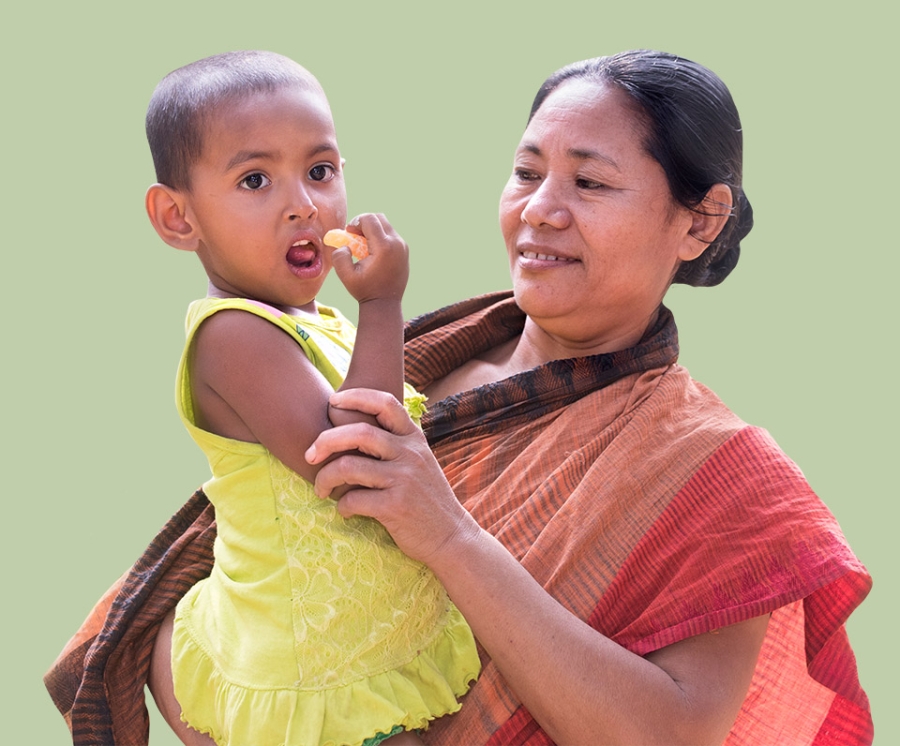Gender
At the core of GAIN's work is the understanding that women’s empowerment, and norms and institutions that enable it is essential for achieving GAIN's mission of healthier diets for all, especially for those most vulnerable to malnutrition.
At the core of GAIN's work is the understanding that women’s empowerment, and norms and institutions that enable it is essential for achieving GAIN's mission of healthier diets for all, especially for those most vulnerable to malnutrition.
GAIN is dedicated to integrating gender considerations—men's and women’s distinct needs and priorities—into all our activities, from project delivery to policy support. Women and girls are particularly vulnerable to malnutrition and food insecurity, influenced by biological factors and social norms. Malnutrition during key stages such as pregnancy and lactation not only affects women but also has lasting impacts on their children, creating a cycle of malnutrition across generations. Women's pivotal role throughout food systems is hindered by systemic barriers to productivity and to the equitable distribution of benefits. Additionally, food system policies often overlook gender dynamics and women's needs, marginalizing their voices in policy and governance processes.
At GAIN, we work toward both gender equity and equality by tackling the barriers that prevent women and men from having a fair chance to lead healthy and prosperous lives with agency. According to UNFPA, gender equity means taking targeted steps to address historical and social disadvantages that prevent women and men from starting on a level playing field. This is accomplished by identifying and addressing men's and women’s distinct needs and priorities in food systems. Equity is often an important approach to reach gender equality, where women and men have equal access to opportunities, resources, and benefits, and can exercise control over their lives.
Women's empowerment is central to this process. Access to nutritious food, health knowledge and care, and productive resources, provides women and girls with tools they need to take charge of their lives.
Women’s empowerment is directly tied to GAIN's mission of healthier diets for all: When women and girls are empowered, they are better equipped to make informed decisions about nutrition and health, ensuring healthier families and communities. In turn, their contributions strengthen food systems and drive sustainable development, creating a ripple effect that advances equity, equality, and well-being for all.
GAIN aims to equip women and girls with the knowledge and increased agency they need to eat healthier diets. For instance, Transform Nutrition and Okhokelamo Ni Solha projects in Mozambique are engaging adolescent girls in the Jogo das Heroínas (Heroines’ games) to engage adolescent girls in positive habits related to nutrition, hygiene, and personal development, establishing a foundation for lifelong health and well-being.
By promoting healthy, safe, and supportive work environments in female dominated sectors, our Workforce Nutrition Programme addresses some of the structural challenges women face in formal sector employment while improving diets directly, as presented in this impact story. Programme activities comprise of improved access to healthy food, breastfeeding support, nutrition related health checks with follow-up dietary counselling, and nutrition education in the workplace.
By amplifying women’s and girl’s voices in food systems policy at local and national levels, GAIN promotes more inclusive and equitable food system policy landscapes. Through the Nourishing Food Systems Pathways Programme, GAIN works to strengthen the gender-responsiveness of food systems policies. Applying a novel analytical tool, we identify gaps in the national policy landscape for supporting women’s participation in and benefits from the food system and propose policy recommendations to respond to the gaps. The programme also supports inclusion of youth—girls and boys—voices in food systems policy development and implementation, led by the Youth Team. As well as supporting women’s voices in food system governance, and integrating gender considerations in social protection initiatives.
By supporting improved coordination of local policymakers and stakeholders and inclusion of women and informal food actors in local food system policies and processes, the Food systems Governance Theme works towards inclusive resilient local food systems that work for all genders.
The CASCADE programme (a CARE & GAIN consortium) works with community leaders and women’s groups to address restrictive gender norms and increase women’s nutrition sensitive productive capacity, while also supporting coordination, capacity, & accountability of local govt and service providers.

The integration of gender considerations into all our activities is led by the Gender Team, through technical guidance and programmatic support to ensure that gender is effectively considered throughout the project lifecycle. GAIN’s 2019 Programmatic Gender Strategy sets out the rationale for and overview of actions needed to integrate gender into GAIN’s programming. Building on this strategy, the team has developed a set of screening tools for project design, delivery, and monitoring based on the Reach-Benefit-Empower-Normalize framework.
Strategic Focus: The Gender Team supports a results-oriented approach to institutional mainstreaming, integrating gender-specific indicators into project results frameworks, aligning them with GAINs Performance Management Framework (PMF). Project indicators and institutional key performance indicators are based on the Reach-Benefit-Empower-Normalize framework, ensuring accountability and effective progress monitoring. We track both project-level performance against gender-related targets and overall institutional progress toward our vision that all projects reach, benefit, and empower people of different genders and/or promote gender-equitable norms.

Research Lead, Food Systems Governance and Inclusion Unit, Knowledge Leadership